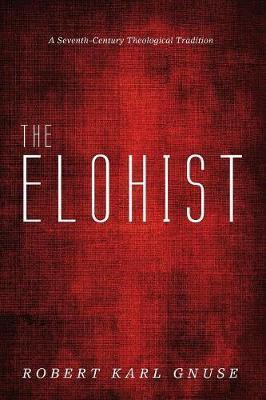The Elohist

The Elohist
Though many Old Testament scholars prefer no longer to speak of the Elohist source in the Pentateuch, Gnuse seeks to defend the existence of this pentateuchal tradition by responding to scholarly critics, isolating texts belonging to the source and offering a theological assessment of these texts. Dream reports in ancient Near Eastern texts from the seventh and sixth centuries BCE bear striking familiarity with the biblical dream reports in the Elohist. Prophetic narratives in the books of Samuel and Kings appear to have inspired the subsequent creation of the Elohist narratives in the Pentateuch. Thus, Gnuse situates the Elohist tradition in the seventh century BCE after the fall of the state of Israel in the north in 722 BCE, which is a later date than scholars have attributed to this source in the past. Because of this setting the Elohist texts may be assessed differently than they have been in the past. The texts might have spoken to exiles from the northern state with themes that bespeak devotion to one God, hope of restoration, and absolute obedience to a transcendent deity who is revealed through dreams, fire, and prophets. The author also ponders what these texts say to our modern age. ""In this study, the product of many years of thinking about the Elohist, Robert Gnuse has produced a valuable guide to the central texts and themes of this often overlooked and underappreciated biblical author. The Elohist is well deserving of greater attention, and Gnuse is to be commended for engaging it head-on."" --Joel Baden, Professor of Hebrew Bible, Yale University ""Robert Gnuse has returned to an old question in the critical study of Israelite tradition. He does so with fresh insight and theological imagination. By mobilizing a wide and deep array of scholarship he exposits a particular strand of the tradition that on the one hand attests the transcendence of God, and on the other exhibits the urgency of civil disobedience. His book is compelling evidence of the way in which critical study of the Scriptures serves contemporary theological interpretation."" --Walter Brueggemann, Columbia Theological Seminary ""Against the grain of much contemporary scholarship, Gnuse presents a formidable case for the Elohist as a seventh-century BCE source in the Pentateuch. The analysis brilliantly brings the Elohist narratives to life as a northern theological response to the fall of Israel in 722 BCE Gnuse also illustrates the theological relevance of the Elohist to
PRP: 167.40 Lei
Acesta este Pretul Recomandat de Producator. Pretul de vanzare al produsului este afisat mai jos.
150.66Lei
150.66Lei
167.40 LeiLivrare in 2-4 saptamani
Descrierea produsului
Though many Old Testament scholars prefer no longer to speak of the Elohist source in the Pentateuch, Gnuse seeks to defend the existence of this pentateuchal tradition by responding to scholarly critics, isolating texts belonging to the source and offering a theological assessment of these texts. Dream reports in ancient Near Eastern texts from the seventh and sixth centuries BCE bear striking familiarity with the biblical dream reports in the Elohist. Prophetic narratives in the books of Samuel and Kings appear to have inspired the subsequent creation of the Elohist narratives in the Pentateuch. Thus, Gnuse situates the Elohist tradition in the seventh century BCE after the fall of the state of Israel in the north in 722 BCE, which is a later date than scholars have attributed to this source in the past. Because of this setting the Elohist texts may be assessed differently than they have been in the past. The texts might have spoken to exiles from the northern state with themes that bespeak devotion to one God, hope of restoration, and absolute obedience to a transcendent deity who is revealed through dreams, fire, and prophets. The author also ponders what these texts say to our modern age. ""In this study, the product of many years of thinking about the Elohist, Robert Gnuse has produced a valuable guide to the central texts and themes of this often overlooked and underappreciated biblical author. The Elohist is well deserving of greater attention, and Gnuse is to be commended for engaging it head-on."" --Joel Baden, Professor of Hebrew Bible, Yale University ""Robert Gnuse has returned to an old question in the critical study of Israelite tradition. He does so with fresh insight and theological imagination. By mobilizing a wide and deep array of scholarship he exposits a particular strand of the tradition that on the one hand attests the transcendence of God, and on the other exhibits the urgency of civil disobedience. His book is compelling evidence of the way in which critical study of the Scriptures serves contemporary theological interpretation."" --Walter Brueggemann, Columbia Theological Seminary ""Against the grain of much contemporary scholarship, Gnuse presents a formidable case for the Elohist as a seventh-century BCE source in the Pentateuch. The analysis brilliantly brings the Elohist narratives to life as a northern theological response to the fall of Israel in 722 BCE Gnuse also illustrates the theological relevance of the Elohist to
Detaliile produsului









